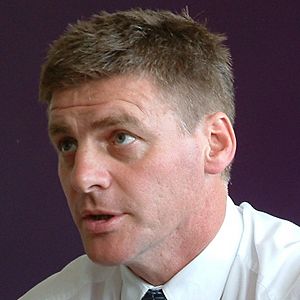Bill English facts for kids
Quick facts for kids
Sir Bill English
|
|||||||||||||||||||||||||||
|---|---|---|---|---|---|---|---|---|---|---|---|---|---|---|---|---|---|---|---|---|---|---|---|---|---|---|---|
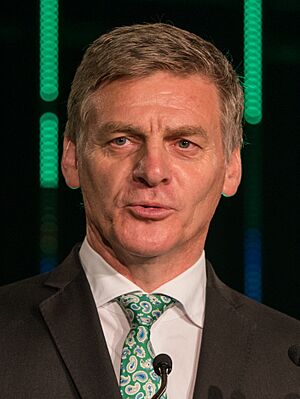
English in 2017
|
|||||||||||||||||||||||||||
| 39th Prime Minister of New Zealand | |||||||||||||||||||||||||||
| In office 12 December 2016 – 26 October 2017 |
|||||||||||||||||||||||||||
| Monarch | Elizabeth II | ||||||||||||||||||||||||||
| Governor-General | Patsy Reddy | ||||||||||||||||||||||||||
| Deputy | Paula Bennett | ||||||||||||||||||||||||||
| Preceded by | John Key | ||||||||||||||||||||||||||
| Succeeded by | Jacinda Ardern | ||||||||||||||||||||||||||
| 29th Leader of the Opposition | |||||||||||||||||||||||||||
| In office 26 October 2017 – 27 February 2018 |
|||||||||||||||||||||||||||
| Prime Minister | Jacinda Ardern | ||||||||||||||||||||||||||
| Deputy | Paula Bennett | ||||||||||||||||||||||||||
| Preceded by | Jacinda Ardern | ||||||||||||||||||||||||||
| Succeeded by | Simon Bridges | ||||||||||||||||||||||||||
| In office 8 October 2001 – 28 October 2003 |
|||||||||||||||||||||||||||
| Prime Minister | Helen Clark | ||||||||||||||||||||||||||
| Deputy | Roger Sowry | ||||||||||||||||||||||||||
| Preceded by | Jenny Shipley | ||||||||||||||||||||||||||
| Succeeded by | Don Brash | ||||||||||||||||||||||||||
| 9th Leader of the National Party | |||||||||||||||||||||||||||
| In office 12 December 2016 – 27 February 2018 |
|||||||||||||||||||||||||||
| Deputy | Paula Bennett | ||||||||||||||||||||||||||
| Preceded by | John Key | ||||||||||||||||||||||||||
| Succeeded by | Simon Bridges | ||||||||||||||||||||||||||
| In office 8 October 2001 – 28 October 2003 |
|||||||||||||||||||||||||||
| Deputy | Roger Sowry | ||||||||||||||||||||||||||
| Preceded by | Jenny Shipley | ||||||||||||||||||||||||||
| Succeeded by | Don Brash | ||||||||||||||||||||||||||
| 17th Deputy Prime Minister of New Zealand | |||||||||||||||||||||||||||
| In office 19 November 2008 – 12 December 2016 |
|||||||||||||||||||||||||||
| Prime Minister | John Key | ||||||||||||||||||||||||||
| Preceded by | Michael Cullen | ||||||||||||||||||||||||||
| Succeeded by | Paula Bennett | ||||||||||||||||||||||||||
| 39th Minister of Finance | |||||||||||||||||||||||||||
| In office 19 November 2008 – 12 December 2016 |
|||||||||||||||||||||||||||
| Prime Minister | John Key | ||||||||||||||||||||||||||
| Preceded by | Michael Cullen | ||||||||||||||||||||||||||
| Succeeded by | Steven Joyce | ||||||||||||||||||||||||||
| In office 31 January 1999 – 22 June 1999 |
|||||||||||||||||||||||||||
| Prime Minister | Jenny Shipley | ||||||||||||||||||||||||||
| Preceded by | Bill Birch | ||||||||||||||||||||||||||
| Succeeded by | Bill Birch | ||||||||||||||||||||||||||
| Deputy Leader of the National Party | |||||||||||||||||||||||||||
| In office 27 November 2006 – 12 December 2016 |
|||||||||||||||||||||||||||
| Leader | John Key | ||||||||||||||||||||||||||
| Preceded by | Gerry Brownlee | ||||||||||||||||||||||||||
| Succeeded by | Paula Bennett | ||||||||||||||||||||||||||
| In office 7 February 2001 – 6 October 2001 |
|||||||||||||||||||||||||||
| Leader | Jenny Shipley | ||||||||||||||||||||||||||
| Preceded by | Wyatt Creech | ||||||||||||||||||||||||||
| Succeeded by | Roger Sowry | ||||||||||||||||||||||||||
| 3rd Treasurer of New Zealand | |||||||||||||||||||||||||||
| In office 22 June 1999 – 10 December 1999 |
|||||||||||||||||||||||||||
| Prime Minister | Jenny Shipley | ||||||||||||||||||||||||||
| Preceded by | Bill Birch | ||||||||||||||||||||||||||
| Succeeded by | Michael Cullen | ||||||||||||||||||||||||||
|
|||||||||||||||||||||||||||
| Personal details | |||||||||||||||||||||||||||
| Born |
Simon William English
30 December 1961 Lumsden, New Zealand |
||||||||||||||||||||||||||
| Political party | National | ||||||||||||||||||||||||||
| Spouse | Mary Scanlon | ||||||||||||||||||||||||||
| Children | 6 | ||||||||||||||||||||||||||
| Parents | Mervyn English Norah O'Brien |
||||||||||||||||||||||||||
| Relatives | Rachel Buchanan (niece) | ||||||||||||||||||||||||||
| Alma mater | University of Otago Victoria University |
||||||||||||||||||||||||||
| Signature | |||||||||||||||||||||||||||
Sir Simon William English (born 30 December 1961) is a former politician from New Zealand. He served as the 39th prime minister of New Zealand from 2016 to 2017. Before that, he was the deputy prime minister and minister of finance for eight years under Prime Minister John Key.
Before he entered politics, English was a farmer and worked for the government. He was elected to the New Zealand Parliament in 1990 for the National Party. He became a government minister in 1996.
In 2001, English became the leader of the National Party. After the party lost the 2002 election, he was replaced as leader. He later became the deputy leader again in 2006. When John Key retired in 2016, English became prime minister.
His time as prime minister lasted for about ten months. After the 2017 election, Jacinda Ardern became the new prime minister. English retired from politics in 2018.
Contents
Early Life and Education
Bill English was born in Lumsden, a small town on the South Island. He grew up on a family farm in Dipton and was one of twelve children.
He went to St Thomas's School in Winton and then boarded at St. Patrick's College, Silverstream, where he was head boy and played rugby. For his higher education, he studied commerce at the University of Otago and English literature at Victoria University of Wellington.
After university, English worked on his family's farm. He then moved to Wellington to work as a policy analyst for the New Zealand Treasury. This department gives advice to the government on spending and the economy.
Starting a Career in Politics
| New Zealand Parliament | ||||
| Years | Term | Electorate | List | Party |
| 1990–1993 | 43rd | Wallace | National | |
| 1993–1996 | 44th | Wallace | National | |
| 1996–1999 | 45th | Clutha-Southland | 9 | National |
| 1999–2002 | 46th | Clutha-Southland | 4 | National |
| 2002–2005 | 47th | Clutha-Southland | 1 | National |
| 2005–2008 | 48th | Clutha-Southland | 4 | National |
| 2008–2011 | 49th | Clutha-Southland | 2 | National |
| 2011–2014 | 50th | Clutha-Southland | 2 | National |
| 2014–2017 | 51st | List | 2 | National |
| 2017–2018 | 52nd | List | 1 | National
|
English joined the National Party in 1980. At the 1990 election, he was elected to Parliament to represent the Wallace electorate. He and three other new National MPs were seen as future leaders of the party.
Becoming a Government Minister
In 1996, at age 34, English was made a minister in the Cabinet, the group of top government decision-makers. He became the Minister for Crown Health Enterprises. After the 1996 election, he was appointed Minister of Health.
As Health Minister, he continued the work of changing the public health system. These changes were not very popular at the time. In 1999, he was promoted to Minister of Finance, but his party lost the election later that year.
Leader of the Opposition
After the National Party lost the 1999 election, English became the party's spokesperson for finance. In 2001, he was elected to be the new leader of the National Party, which made him the Leader of the Opposition.
At 39, he was one of the youngest leaders in the party's history. However, in the 2002 election, the National Party had its worst result ever. English called it "the worst day of my political life."
Because the party's support in opinion polls was still low a year later, he was replaced as leader by Don Brash in October 2003.
Return as Deputy Leader
English remained an important Member of Parliament. In 2006, when Don Brash resigned as leader, English became the deputy leader under the new leader, John Key. This created a strong leadership team for the National Party.
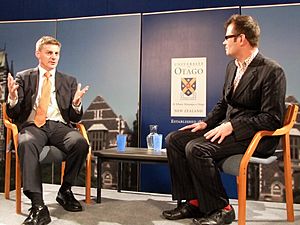
The National Party won the 2008 election. English became the Deputy Prime Minister and was also made Minister of Finance for the second time.
As Finance Minister, he had to deal with the 2008 financial crisis. His main goal was to reduce government debt. He focused on helping businesses grow and investing in infrastructure like roads and public buildings. Under his management, New Zealand's economy grew steadily.
In 2009, there was a controversy about the housing allowance he received as a minister. After a review, he paid back some of the money and stopped claiming the allowance.
Prime Minister of New Zealand (2016–2017)
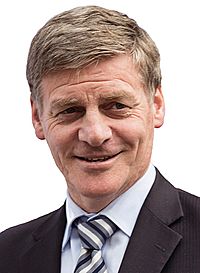 |
|
|
Premiership of Bill English
|
|
|---|---|
| 12 December 2016 – 26 October 2017 | |
| Elizabeth II | |
| Cabinet | Fifth National Government of New Zealand |
| Party | New Zealand National Party |
| Appointer | Patsy Reddy |
|
← John Key • Jacinda Ardern →
|
|
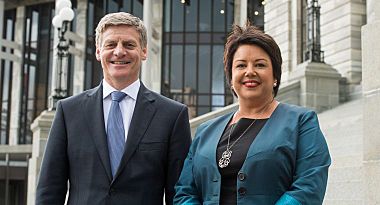
When John Key retired in December 2016, Bill English was chosen to be the new leader of the National Party. He was sworn in as New Zealand's 39th Prime Minister on 12 December 2016.
As prime minister, English traveled to Europe to discuss trade deals with leaders like British Prime Minister Theresa May and German Chancellor Angela Merkel.
He announced that the 2017 general election would be held on 23 September. In the election, the National Party won the most seats, but not enough to form a government by itself. The New Zealand First party chose to form a government with the Labour Party instead. As a result, Jacinda Ardern became the next prime minister.
Life After Politics
English became the Leader of the Opposition again but announced his retirement from politics in February 2018.
Since leaving politics, English has joined the boards of several companies, including the Australian company Wesfarmers. He is also involved in reviewing the performance of government agencies. In 2023, he was asked to lead a review of Kāinga Ora, New Zealand's public housing agency.
Personal Life and Honours
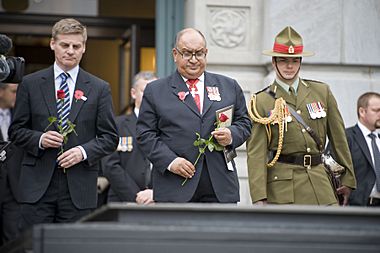
English is married to Dr. Mary Scanlon, a general practitioner. They met at university and have six children. He is a practising Roman Catholic.
In 2002, he participated in a celebrity boxing match called Fight For Life to raise money for a youth charity.
For his service to New Zealand, he was made a Knight Companion of the New Zealand Order of Merit in the 2018 Queen's Birthday Honours. This is why he is called "Sir" Bill English.
See also
 In Spanish: Bill English para niños
In Spanish: Bill English para niños


